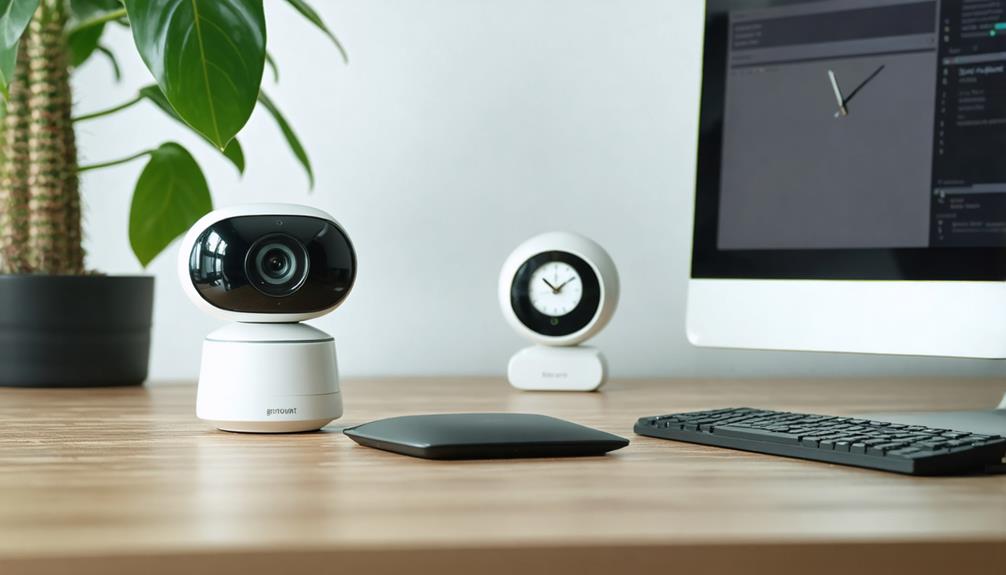
Brainstorm Security Shop

For Orders Over $199

On Any Of Our Products

Details On Refund Page
You’re likely aware of the growing trend of office spy cameras for employee monitoring and security enhancement, but have you considered the implications? While these devices can improve accountability and track productivity, they also spark significant privacy concerns among staff. Striking a balance between security needs and employee comfort isn’t straightforward. So, what factors should you weigh when deciding to implement such technology, and how can you ensure compliance with legal and ethical standards? The answers might surprise you.
When it comes to ensuring workplace security, understanding office spy cameras is essential. These devices can play a crucial role in employee monitoring, allowing you to keep an eye on activities within your office.
However, as you dive into this topic, it’s vital to recognize the privacy concerns that come with using such technology. You’ll need to balance the benefits of surveillance with the potential discomfort it may cause among your staff. Employees might feel like they’re constantly being watched, leading to a decrease in morale and trust.
To mitigate these feelings, consider being transparent about the presence of cameras and their intended purpose. Additionally, familiarize yourself with the laws surrounding surveillance in your area. Different regions have different rules regarding employee monitoring, and violating these can lead to serious consequences for your business.
You might find it beneficial to consult legal experts to ensure compliance. Ultimately, while office spy cameras can enhance security and provide valuable insights, it’s crucial to approach their implementation thoughtfully, keeping both workplace safety and employee privacy at the forefront.
Spy cameras can offer numerous advantages that enhance workplace security and efficiency. By implementing these devices, you can address various issues related to privacy concerns and employee monitoring while improving overall productivity. Here are some key benefits of using spy cameras in your office:
While it’s essential to navigate privacy concerns carefully, the advantages of using spy cameras can significantly boost your office’s security and productivity. By implementing these devices thoughtfully, you can foster a more secure, efficient work environment.
Before installing spy cameras in your office, it’s crucial to understand the legal considerations and regulations that govern their use. Laws vary by state and country, so you need to familiarize yourself with the specific guidelines in your area. Generally, you can’t record audio without consent, as this raises significant privacy concerns. Always check local laws regarding video surveillance to avoid potential legal issues.
You should also consider the ethical implications of using spy cameras. Employees may feel their privacy is invaded, leading to distrust and a toxic workplace environment. Transparency is vital; inform your staff about the cameras’ presence and their purpose. This approach not only aligns with ethical standards but also fosters a culture of openness.
Additionally, think about where you plan to place the cameras. Public areas are more acceptable, while private spaces, like restrooms or break rooms, are typically off-limits.
How do you determine which camera best suits your office needs? Selecting the right camera involves assessing various factors to ensure effective, discreet monitoring. You want a system that blends seamlessly into your environment while providing the surveillance coverage you require. Here are some key considerations to keep in mind:
Implementing office spy cameras effectively requires a strategic approach to ensure maximum security and minimal disruption.
First, you need to assess the areas that require surveillance, focusing on high-risk zones without encroaching on employee privacy. It’s crucial to maintain a balance between security needs and respecting your employees’ rights.
Before installation, inform your team about the purpose of workplace surveillance. Open communication fosters trust and helps mitigate concerns about invasive monitoring. Make sure to comply with local laws regarding surveillance; this can save you from potential legal issues.
Choose cameras that blend seamlessly into the office environment to avoid creating an uncomfortable atmosphere. Opt for high-quality equipment that offers clear images, and consider features like remote access for real-time monitoring.
Once installed, regularly review footage and analyze patterns to identify security risks. Keep an eye on camera functionality, performing maintenance to ensure everything operates smoothly.
Lastly, create a clear policy regarding who can access the footage and how it’ll be used. By following these best practices, you can implement spy cameras effectively while respecting employee privacy and maintaining a positive workplace culture.
You can detect hidden cameras by looking for unusual objects or reflective surfaces. Remember, employee privacy matters, and legal implications arise if cameras operate without consent. Stay informed about your rights and the detection methods available.
When installing cameras, consider high-traffic areas like entrances and exits for optimal surveillance effectiveness. Always address privacy concerns and legal considerations to ensure employee behavior remains compliant and respectful, fostering a trustworthy workplace environment.
Wireless spy cameras capture video with high recording quality and transmit it over Wi-Fi. You can access the footage remotely through your smartphone or computer, allowing you to monitor activities from anywhere at any time.
When selecting a camera, prioritize camera quality and consider legal implications. Brands like Arlo and Ring offer reliable options. Always ensure you’re compliant with local laws regarding surveillance to avoid potential legal issues.
To ensure your camera footage is secure and private, implement data encryption, establish access control, and develop strong privacy policies. Don’t forget to consider legal considerations to comply with relevant regulations and protect individual rights.
